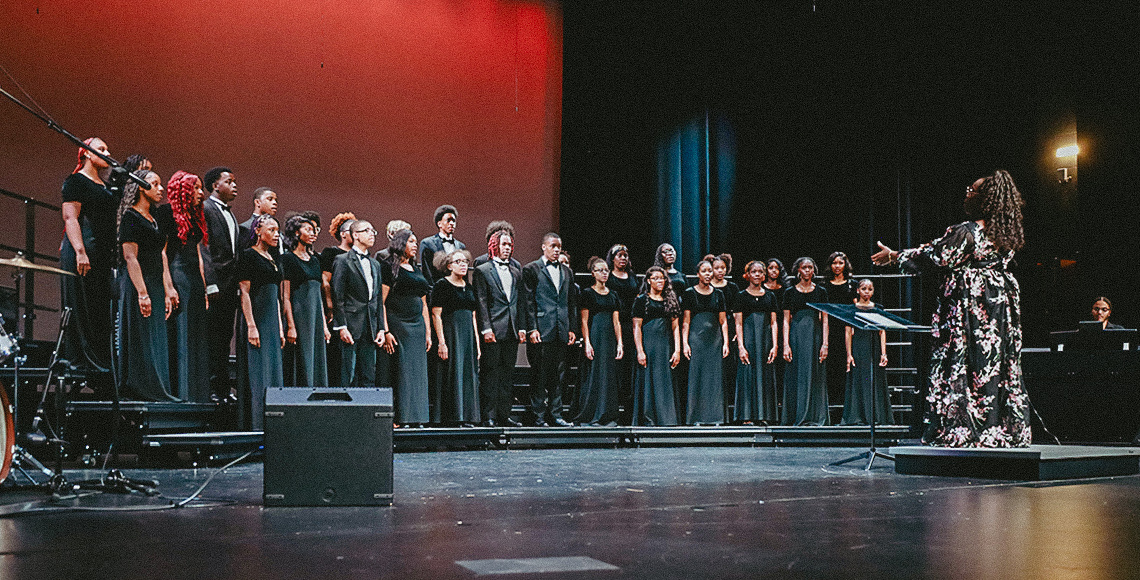Ridge View High School performance photos courtesy of photographer Dejon Johnson.
Days are often busy in Alex Thompson's Ridge View High School choir room. Students stop by before the homeroom bell rings, hang out between classes and fill the risers for each rehearsal. The flurry of activity continues after the school day ends, with students staying late to prepare for special performances like the Midlands Choral Performance Assessment (CPA). Throughout these moments, friendships form as voices mingle.
“It’s so frustrating that people don’t understand how that music class, or that theater class, or the art class might be the only thing keeping a kid coming to school every day,” says the 2020 South Carolina Honors College graduate from Grovetown, Georgia. Knowing that students feel safe and welcome in her classroom is enough to move Thompson to tears.
“I don’t let them see me cry,” she assures. “I’d lose cool points.”
For Thompson, fostering a feeling of belonging is just as important — if not more important — than improving intonation, harmony and rhythm. After all, a conductor makes no sound: A conductor's role is to unite the group and encourage them to perform to the best of their ability.
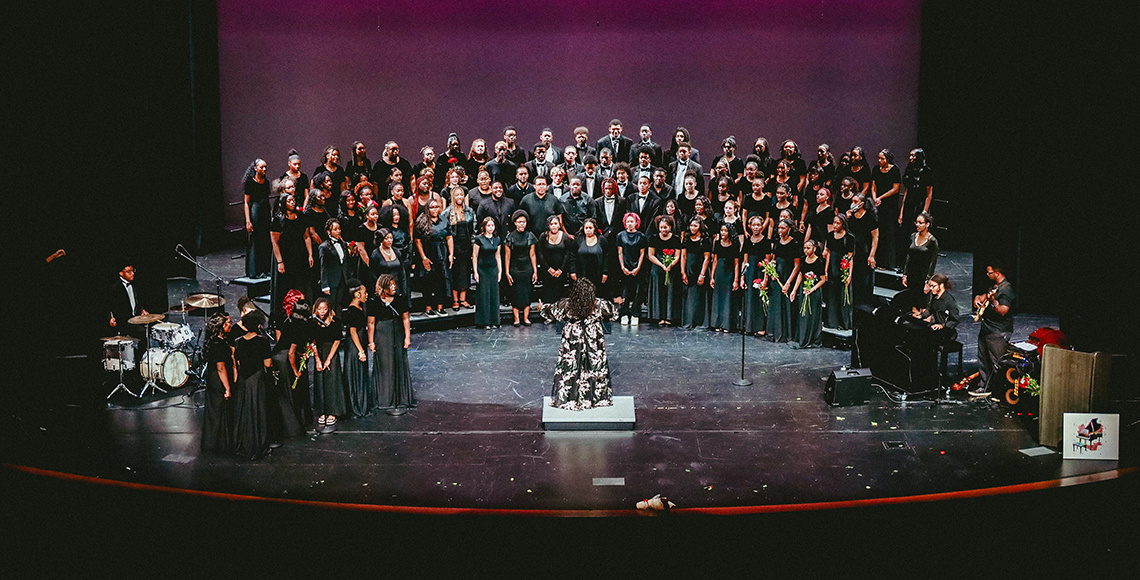
This passion for community and belonging has motivated Thompson for as long as she can remember. She has always been a leader inside and outside of the classroom: In high school, she was the soprano section leader and president of her choir. And as a music education major at the University of South Carolina, she was the co-founder and first president of the SCHC Black Honors Caucus.
The Black Honors Caucus is a supportive community and professional development space for Black SCHC students. The organization celebrated its fifth anniversary in February 2024, and Thompson couldn’t be prouder.
“Just seeing how much Black Honors Caucus has grown since we started it blows my mind constantly,” she reflects. “I get emotional every time I talk about it, because that was our baby.”
Filling a gap
Thompson began the process of co-founding the Black Honors Caucus in the fall of 2018. She connected with fellow Honors students Taryn (Moyer) McDonald, Olivia Williams, Christal Harvin and Uriah Chapman to discuss creating a space dedicated to Black students in the Honors College — a space that Thompson, especially as an out-of-state student, had been missing throughout her undergraduate experience.
“I would walk ten minutes from the School of Music all the way to Greene Street so I could be around other Black people,” she recalls. There, she would join in on Hip Hop Wednesday celebrations, a weekly event organized by USC’s Center for Student Engagement. In her Honors courses, however, Thompson noted that she was often the only Black student in the class. From these kinds of experiences, and from that desire for community, the Black Honors Caucus was born.
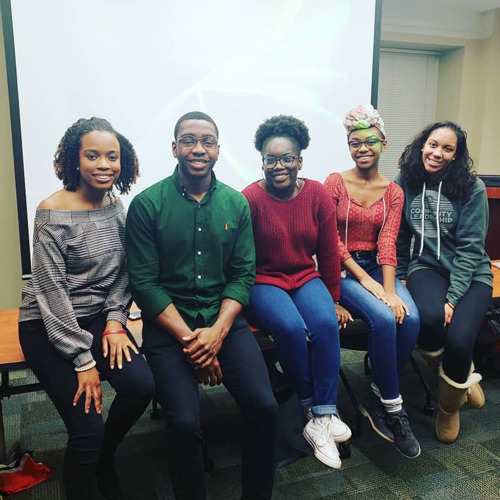
“So (our) why was because we found ourselves underrepresented and unheard in our academic environment, and the goal of having Black Honors Caucus was to service high-achieving Black students and give them a safe space to convene and share ideas unapologetically and without fear,” says Thompson.
She credits professor Kay Thomas, Honors College assistant dean for student affairs, for serving as the organization’s advisor; she and Dean of the Honors College Steve Lynn provided the founders with resources and support as the organization took shape.
“They created a space where Black Honors students could truly feel seen, supported, and valued,” says Thomas. “What started as a few events has grown into something lasting — traditions that we’ve continued, strengthened and rooted even deeper in culture, community and connection.”
According to Thompson, the founders determined three main goals: increase the percentage of Black students in the Honors College; create professional development opportunities such as leadership, academic and professional connections, and volunteering; and increase camaraderie between Black students in Honors.
“We got a lot of stuff done in those first couple years, and everybody was just on it,” says Thompson. “We had ideas. It was something that we were super committed to.”
Building a community
The founders became the first slate of executive board members, with Thompson stepping into the role of president. Through their recruitment efforts, the organization grew to 21 members in 2018 – 2019. By the 2019 – 2020 academic year, the Black Honors Caucus had a thriving membership and a full schedule of events and activities.
One of these, Thompson recalls, was Black & Connected. The goal was simple: bring in Black professionals to connect with Black students and provide professional guidance.
The logistics? Not so simple. Thompson attests that the BHC had to start planning from scratch, as they had never seen a comparable event on campus.
“I think that’s a very unique event that Black Honors Caucus does — hosting alumni and Black professionals to connect with current students, giving them the keys to the kingdom,” she says.
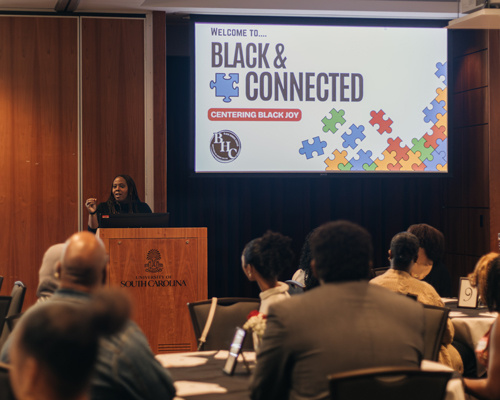
Planning involved, not only coordinating with guests, but also publicizing the event beyond the Honors College. According to Thompson, the process of contacting professionals produced a domino effect, with each guest recommending others for the BHC to contact.
“They were always so gracious,” she remembers.
Black & Connected continues to this day, along with other events like Black & Cultured, which connects members with cultural events in Columbia, South Carolina. As the organization launched new events and continued to welcome new classes of students, the BHC inspired other student affinity groups on campus. Thompson notes that organizations like the Black Capstone Caucus and the Q+ Honors Caucus followed the example set by the BHC.
Members of the BHC grew, as well. Thompson recalls the excitement of seeing students she knew as first- and second-years step up into executive roles later in their undergraduate careers. Thompson is committed to staying connected with the community she fostered; she stays up-to-date with the group on Instagram and meets with professor Thomas, who is still the group’s advisor.
“I’m so very connected to the people that I met at Carolina. It’s been a real community and something really grounding for me, as I’m still not living in my home state,” she says. “To have built those connections and to see other people excel, that’s so rewarding.”
Taking the next step
Days are indeed busy in Alex Thompson's high school choir classroom, and she wouldn't have it any other way. She mentions that she “found her groove” in the Ridge View community and built on the momentum she gained at USC.
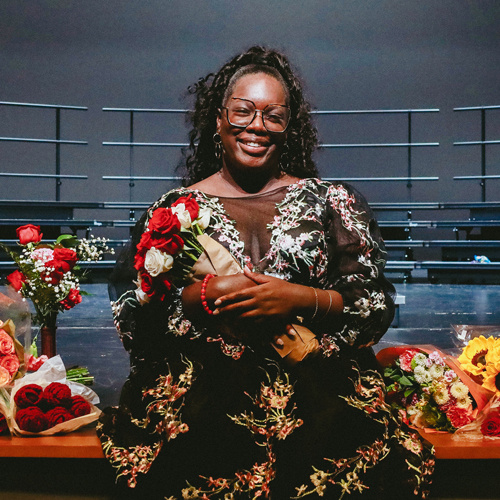
“I think that going (on) from BHC, and then Ridge View, (it) is a predominantly Black school, so most of my students are Black,” she says. She strives to “program music that I know that they’re going to really enjoy, but also to perform authentically.” Their repertoire spans from Palestrina to gospel, and she appreciates that her students are willing to perform it all with enthusiasm.
She’s grateful for the opportunity to teach young singers and play a role in their musical journeys. In turn, the experience has inspired her to take a next step of her own. This fall, Thompson will begin a master’s program in choral conducting at Georgia State University. She leaves behind a legacy of choral music and community in South Carolina — a legacy that she is confident will continue.
“I just cannot help but be so, so happy for the kids who get to experience Black Honors Caucus, as it is now, and the work that came after the original group of kids who were there that first year. The legacy has continued on because people wanted it to continue, and the work we put in to make sure that it did stay alive. So, I think that’s one of the things that I’m proudest of that I’ve ever done in my life.”
